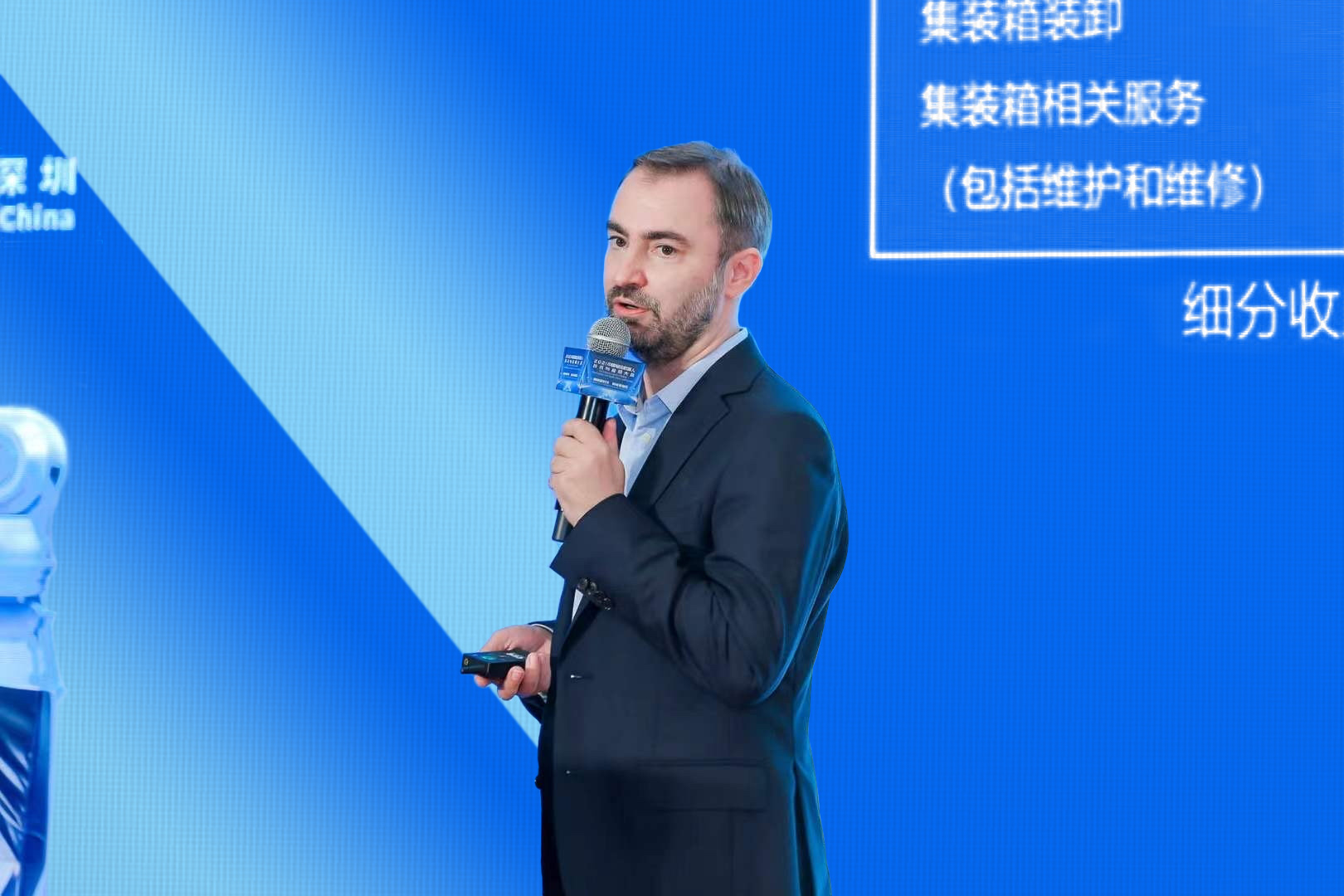
As is often the case, the day begins in Shanghai with slightly scratchy announcements via a megaphone. The inhabitants of the residential area are being asked to go for a PCR test. This has become routine at least since February, before the lockdown in Shanghai. And, unfortunately, nothing much has changed since the end of the lockdown in early June.
You are at liberty to ignore the announcements, provided you have been tested within the past 72 hours at one of the thousands of test centres set up in the megacity of 26 million inhabitants. My name is Lars Anke, and I came to Shanghai because it is home to the largest container port in the world. I am representing the interests of HHLA in Asia, which is a complex task in these challenging times.
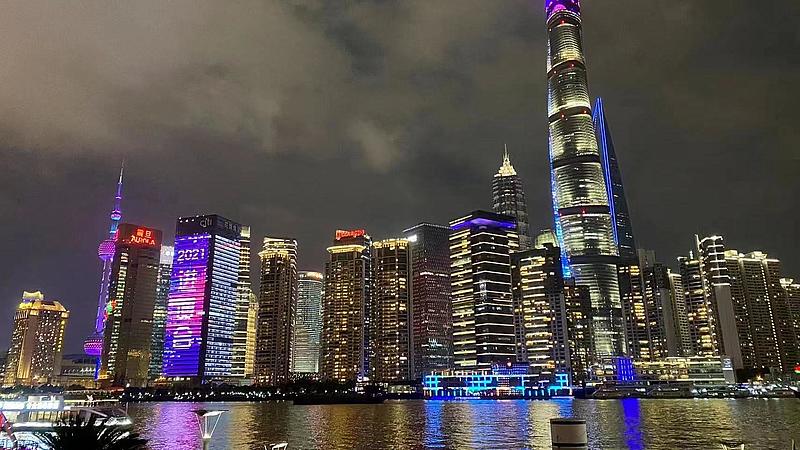
My first appointment of the day takes me to the Shanghai International Port Group (SIPG). My Chinese colleagues working there have been faced with enormous challenges in the past few months. They were constantly on high alert for potential coronavirus outbreaks and the unavoidable subsequent lockdowns. As a result, hundreds of container ships were stuck in the port, causing delays in the hinterland traffic, which were only exacerbated by detailed infection checks of truckers, inland waterway ships and cargoes.
Port closures and subsequent container deluge
This also affected us in Hamburg because the port closures and ship delays in the Far East also had an impact on the European ports. And not just there. German industries ran out of certain components and some retail goods were hard to come by. Later, lots of ships all arrived at once. This deluge of containers also brought processes at the HHLA terminals to a standstill.
There has been a long, friendly partnership between SIPG and Hamburg. Many years ago, when the new deep-water port was created on the island of Yangshan, we exchanged experiences with regard to the automation of port terminals. Today, Phase 4 on Yangshan is one of the most cutting-edge automated terminals in the world.
From the SIPG headquarters on the Huangpu River, it’s not far to the Shanghai offices of HHLA, my home from home, as it were. The next topic for me to deal with is vehicular automation. Chinese start-ups such as Senior Automotive have made great progress recently, which could also be of interest for our terminals. In a meeting that is happily in person and not remote, the CEO of the company, Mr Wang, reports on his project successes. His vehicles are already in use at the ports of Ningbo and Lianyungang.
Our approach is to share similar experiences and benefit from them, not only in terms of vehicular automation but in all areas in which HHLA conducts business. Due to its size and nearly 1.4 billion inhabitants, China is an enormous sales market for Germany. Providing each other with market access offers potential that needs to be tapped. For this reason, various European partners have helped to develop the Chinese ports in recent decades and acquired various stakes, particularly the Danish shipping company Maersk with its terminal operator subsidiary APM.
Of course, on a critical note, in addition to the general challenges of the market, it must be stated that China continues to discriminate against foreign investors in many areas from a regulatory perspective. As a result, risks must be excluded before market opportunities can be realised. However, German expertise, our thoroughness and, above all, our roots in the complex European market are highly valued by our Chinese partners.
“Providing each other with market access offers potential that needs to be tapped. For this reason, European partners have helped to develop the Chinese ports and acquired various stakes.”
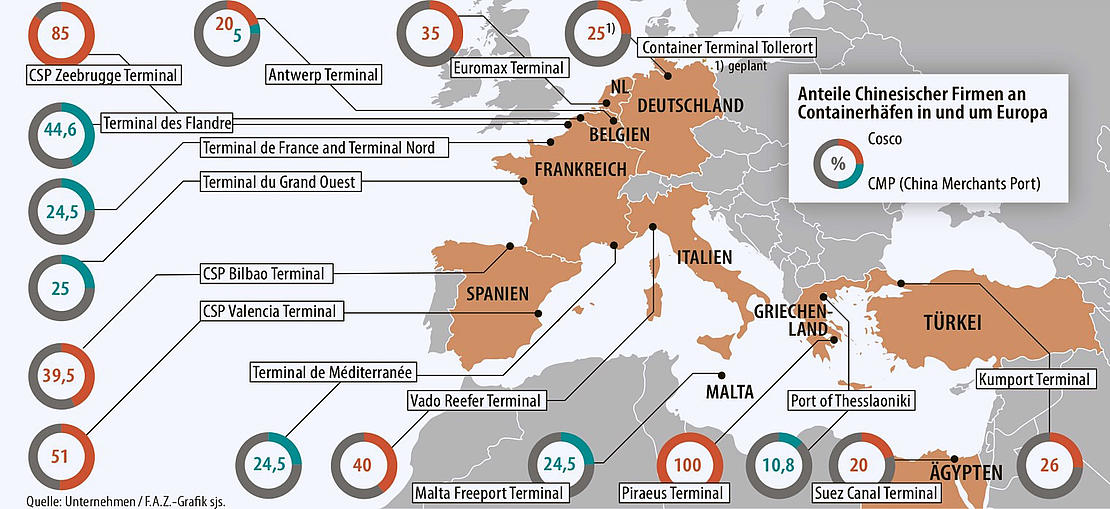
Business partners see the benefits of a win-win situation
Our business partners also see the benefits of a win-win situation. This results in a high willingness to allow us access to Chinese networks, which makes it easier to tap into the market potential presented by the dynamic Chinese logistics sector. The reverse is also true because, from the Chinese perspective, it is not always easy to understand the various differences between the individual European countries, their mentalities and structures.
I now continue on to the COSCO headquarters – one of the biggest clients and long-term partners of the Port of Hamburg and HHLA. We once again come up against coronavirus restrictions: We scan our QR codes when entering the building and wear our masks for our meeting. Here, as at many other appointments, I have to explain the specific handling challenges that the Hamburg terminals were faced with in recent months.
Only good services safeguard the status of the Port of Hamburg
There is a great deal of understanding for the unusual situation triggered by the pandemic and the war in Ukraine. However, some aspects of the business landscape in Hamburg require explanation, such as the co-determination rights of our staff or planning ship calls, taking into account the special requirements for ships passing through the Elbe estuary.
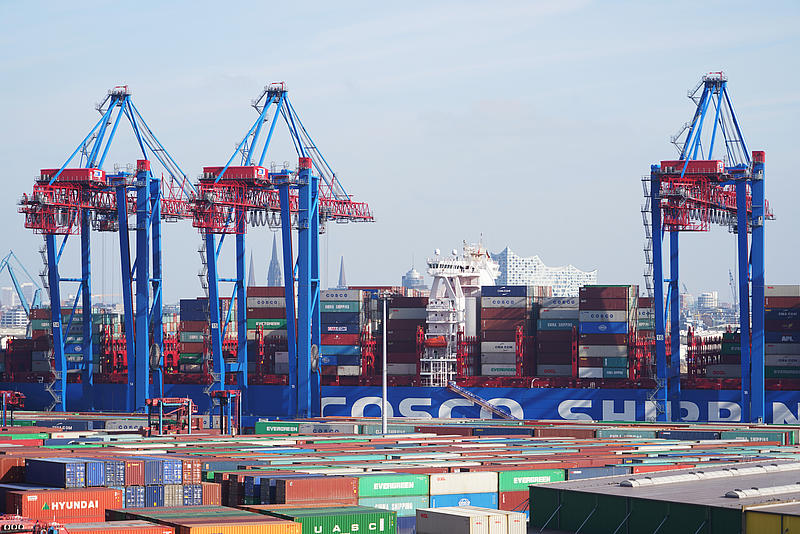
My conversational partners then ask how HHLA is responding to the situation in order to remedy it. These conversations strengthen the customer relationship and attract cargo to the Port of Hamburg. But the competition is developing quickly. Only with reliably good services will Hamburg be able to retain its leading position in northern Europe.
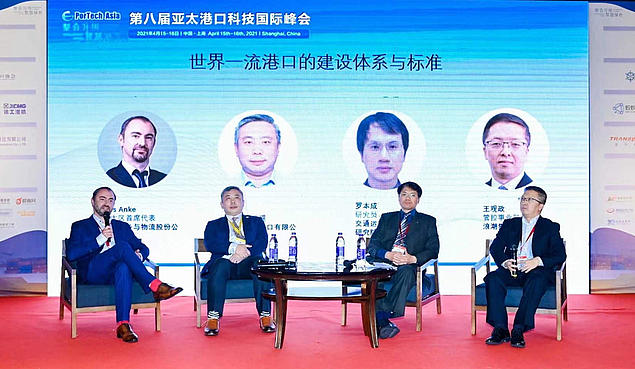
The significance of green logistics is also increasing in China
Later, I switch to the topic of green logistics, which is also becoming more influential in China, too. At a forum organised by the Chinese port association, Chinese and foreign ports present their solutions for more sustainable port operations. HHLA’s sustainability initiatives, particularly at CTA, are met with great interest.
A 30-minute presentation for terminal operators, port administrators and government and ministry representatives, followed by subsequent discussions, primarily serves to highlight HHLA’s expertise, which is then leveraged to generate potential business. China’s economy is largely shaped and controlled by the state, which makes close relationships with political decision makers an essential part of the process.
Mastering challenges with global partnerships
These kinds of events are important – nothing can replace a personal network. The casual, off-stage discussions at the event tend to focus on China’s pandemic policies and the complex geopolitical situation. The Chinese logistics industry is aware that challenges can only be overcome with global partnerships. At the same time, however, political unpredictability is on the rise in all quarters.
Heading back after the event, there’s a spontaneous video chat on Teams. Even at such a late hour – due to the 7-hour time difference – that’s also normal and an everyday occurrence. These kinds of calls replace the conference calls that, in the past, had to be scheduled days in advance. The dialogue with Hamburg is, at least, something that has been made more efficient and straightforward as a result of the pandemic.
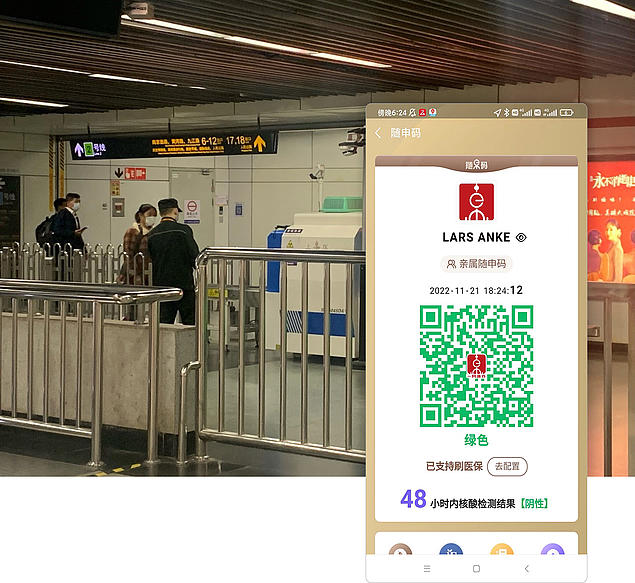
Daily life off limits without a valid coronavirus test
Coronavirus continues to be present in all areas of life in China. Measures have now become a routine part of everyday life. Right at the start of the pandemic, each person in China was assigned a health QR code, stored on their phone. This code has to be scanned everywhere you go – at a restaurant, in the subway or taxi, at events or in a department store.
Thousands of test centres for free PCR tests were set up in Shanghai. If you arrive at one and haven’t had a test for over 48 hours, you will be dealt with quickly. Scan in your QR code, have your throat swabbed and it’s all sorted within three minutes. Once you get your – hopefully – negative test result, the QR code stays green for the next 72 hours.
If you miss this deadline, the QR code turns yellow and you are no longer able to enter the subway, bus, restaurants, shops, taxis or events. There are security guards everywhere who will turn you away.
The lockdown was extended repeatedly for two months
Chains of infection are rigorously traced by the state. If you are a close contact, you are quickly notified and this means a two-day lockdown for the entire residential block. In Shanghai, that’s often 20 to 30 flats. The measures are implemented and tracked by the neighbourhood committees. Three years ago, these committees were an oft-ridiculed remnant of socialist social control – they have now become major instruments in pandemic control.
Travelling is even more complicated. For overseas travel, the long centralised quarantine period upon re-entering China, PCR tests before departure and very expensive flight connections pose major challenges. But even for domestic travel, the requirements are high. Before departure, you must check whether there are any restrictions on travellers from Shanghai in force in your destination region, which might make checking into a hotel, for example, difficult. Up-to-date test results are mandatory, as is downloading a local health code and providing information on your travel history.
This new reality is uncomfortable. But in such a high-tech country as China, it quickly became routine. Using QR codes and online registration sites was something that at least city dwellers were already familiar with in order to pay by weChat or Alipay. People generally buy things online and tickets and travel passes are generally also based on QR codes.
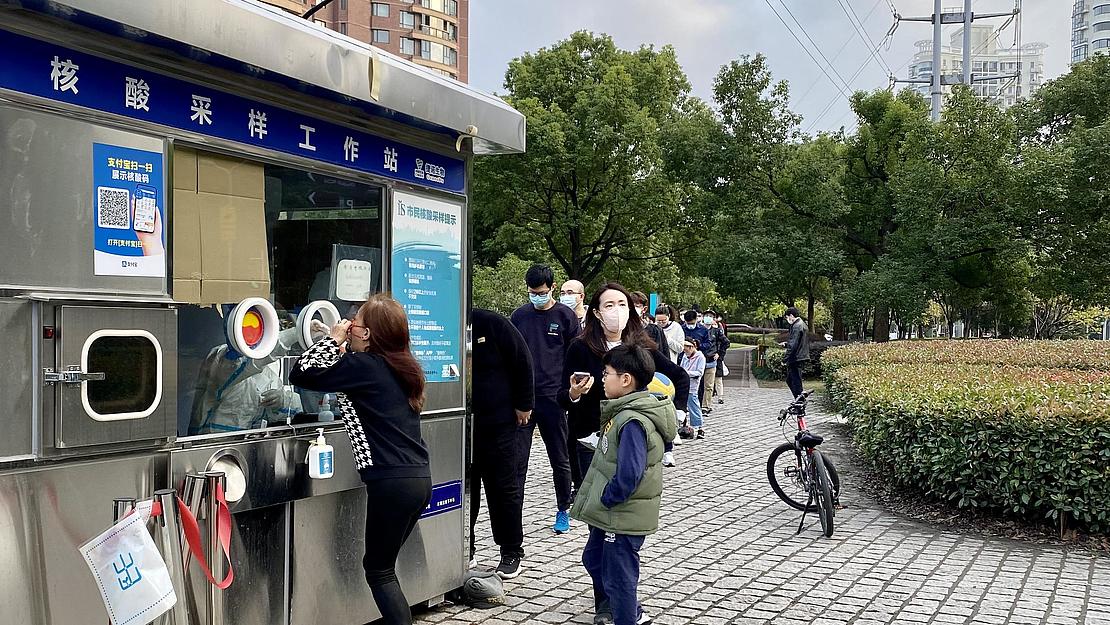
For me and for many of Shanghai’s 26 million residents, the two-month complete lockdown in early 2022 was a very extreme measure. While it showed the efficiency of the administrating bodies, it also showed how arbitrary some of the measures were and how helpless some individuals are in this system. Without any advance warning, a lockdown that was originally due to last four days was extended continually for a total of two months.
Lots of other cities, such as Zhengzhou, Guangzhou and Shenzhen, have experienced similar situations. As a result, the exodus of foreigners from China has accelerated. According to some estimates, more than 60 percent of foreigners have already left China. Only just over 300,000 remain – fewer than in the tiny nation of Luxembourg. If I travel into the Chinese hinterland for work, I often feel like we have gone back in time 20 years, when spotting a “Westerner” was a very unusual occurrence. This new reality is uncomfortable. But in such a high-tech country as China, it quickly became routine.
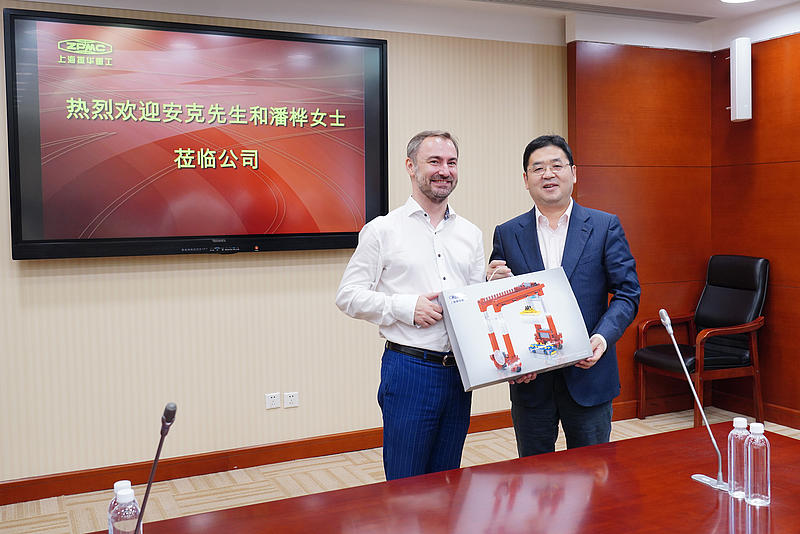
For me, working under these conditions remains a huge challenge but without in-person meetings and personal contacts, problems can be very hard to solve and it is next to impossible to develop new approaches. As a result, I try to maintain the direct presence of HHLA here with as many appointments as possible and to fly our flag for our customers in Shanghai.
It is just as important to observe and understand the local political situation. This also goes for stakeholders in China, who can only follow European politics through the filter of the state media. What effects is the war started by Russia in Ukraine having? Here, HHLA had to continually position itself as a reliable partner for maritime and land transport.

Curious about more faces?
They have a lot to say – from the port, from the past, from their day-to-day work or from abroad.
Chinese decision makers, particularly from state-run companies, have not been able to travel abroad for three years now. During this time, the macroeconomic environment in Europe has changed radically. At the same time, the management teams in Chinese companies are also fluctuating. Lots of colleagues who were familiar with Europe, Germany and HHLA were moved elsewhere and their successors are not yet familiar with the situation.
This is one of the main areas of focus for my work. I have to present HHLA’s specific solutions and our new areas of business, as well as generate understanding for some of our decisions. Because trade fairs and conferences continue to take place normally in the country, I can use such platforms for that purpose.
The foundations are already in place because Germany continues to enjoy a good reputation in China. Of course, the confidence of our Chinese partners has grown hugely. And it’s little wonder if you look at the market share, scale and capitalisation of companies here.
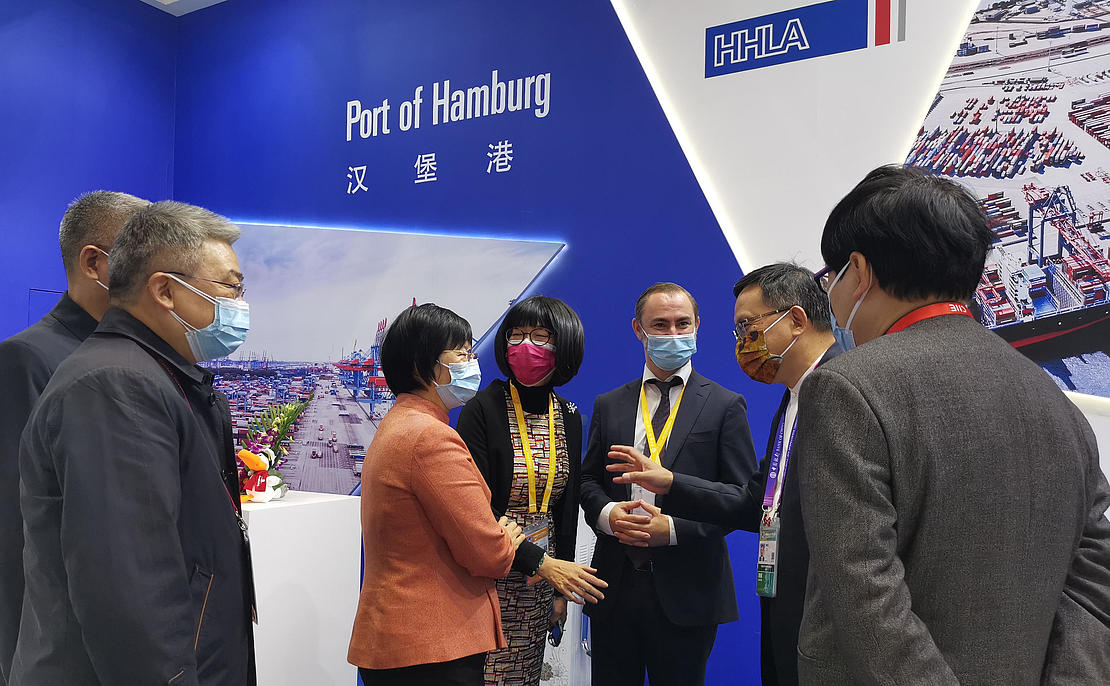
In such times of rising geopolitical tensions, the growing isolation of the country is also not helpful. There’s a latent sense of threat, as there is in Europe and the US for that matter. There’s a suspicion that other countries could damage China’s development and the country’s prosperity.
The latest developments in China’s turbulent relations with Taiwan have strengthened anti-American sentiment. By contrast, Germany is traditionally perceived as a reliable partner.
This doesn’t mean that Germany cannot state or assert its interests vis-à-vis China. On the contrary: The implementation of national or European interest-driven politics is highly respected, even if this does bring with it the occasional problem. Instead, people are more likely to perceive the formation of an EU/US bloc against China as a threat. In China, people worry that, sooner or later, they will be faced with an irrationally acting bloc whose main aim is to limit China’s power.
”The latest developments in China’s turbulent relations with Taiwan have strengthened anti-American sentiment. By contrast, Germany is traditionally perceived as a reliable partner.“
Which strategy is the Communist Party pursuing?
The People’s Republic of China, which was founded 73 years ago, is going through a rapid process of transformation in terms of its local industries – similar to Germany, which had to deal with massive job losses in certain sectors during the 80s and 90s.
In addition, there is politically motivated protectionism, which is on the rise globally, driven by the pandemic, war and inflation. The environmental challenges we face also require new solutions. From a social perspective, this situation exerts enormous pressure on the ruling Communist Party.
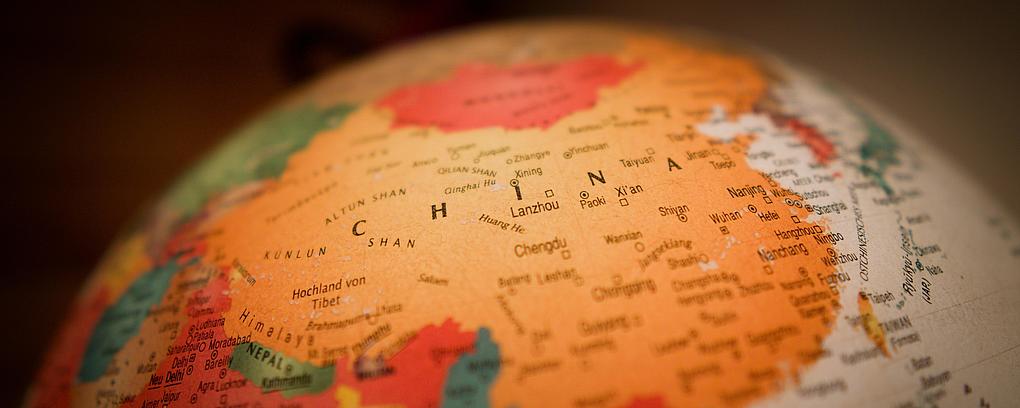
“Withdrawal from China cuts us off”
Germany needs more technological leadership as well as less dependence and dialogue.
How might it respond, and what are its long-term solutions and short-term policies? Trying to assess this isn’t easy – even after over 16 years here and with great contacts at many levels. New domestic political networks after the recent political conference, the geopolitical challenges and economic necessity result in a highly dynamic mix.
In terms of the significance of China for Europe, Germany, the Port of Hamburg and HHLA, we do need to stay on the ball here, though. From my perspective, it is essential to continue our close dialogue with our Chinese partners, old and new. We are and will remain reliant on each other despite our sometimes divergent interests. Only with cooperation and shared approaches to our problems can we ensure a positive future.
